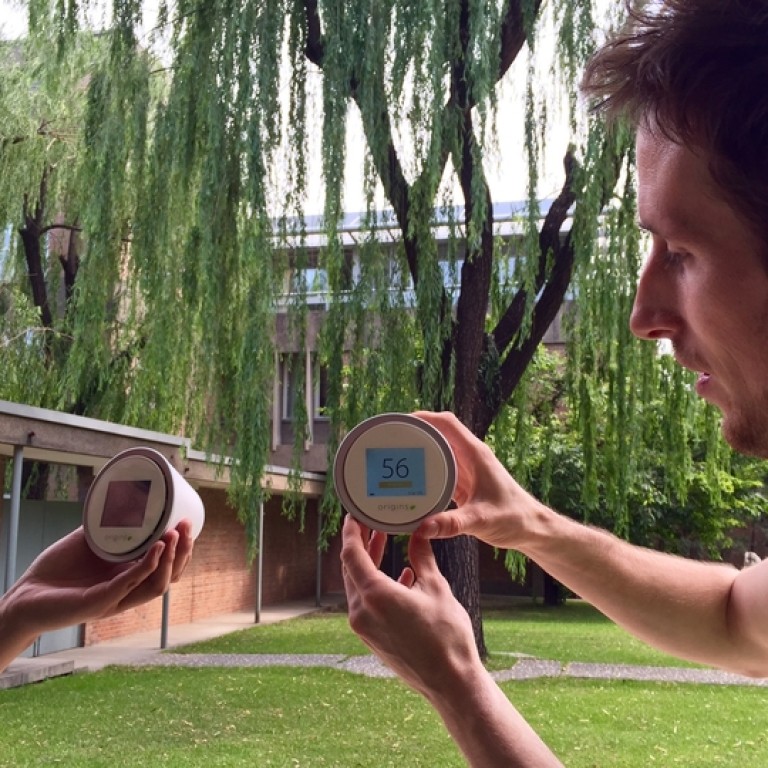
Laser Egg air quality monitor to give indoor pollution readings for Chinese market
A “smart” air quality monitor called the Laser Egg is about to hit the Chinese market, giving smartphone users a new device and app to measure pollution indoors, as well as outside, so they can better plan their day in China’s notoriously smog-filled metropolises.
The product is set to launch later this month after Origins Technology founder Liam Bates, a 27-year-old Swiss entrepreneur, oversaw a successful round of crowdfunding recently on Chinese e-commerce giant JD.com’s platform.
His product, which measures the level of fine particulate matter in the air, attracted more than twice its targeted level of funding two weeks ago. It is shaped like an egg sliced in half but with flatter edges, and resembles a white alarm clock.
“It’s exciting to for us to be able to provide an efficient air-quality monitoring solution to our customers, and gain their support,” he told the South China Morning Post.
“We wanted to make an air quality monitor which can tell you the quality of air in a fast, fun way, and with high accuracy.”
READ MORE: Why indoor air pollution may be worse than it is outdoors
Bates joins a rising tide of gung-ho businesspeople building IT start-ups in China. Some 49 were established every day on average last year in Beijing's Zhongguancun, dubbed China’s Silicon Valley, making a total of nearly 18,000 new arrivals for 2014 as a whole.
Air pollution has become a major concern among the Chinese public in recent years, which has driven demand for air purifiers, face masks and similar products.
Sales of the former will hit 6.7 million units in China this year, according to an industry blue paper. That is more than twice the 3.1 million sold in 2013.
Officials in Beijing launched a plan in 2014 to clean up the capital's air and reduce levels of deadly PM2.5, or fine particle matter that can burrow deep into the lungs, potentially causing heart attacks and raising the risk of cancer.
By 2017, the local government aims to scale back the level of these particles in the capital and neighbouring counties to three-quarters the rate recorded in 2012.
READ MORE: China unveils plan for pollution tax
This encouraged Bates and his team to build their OxyBox air purifier one year ago using a filter based on Swiss technology.
However, the Laser Egg may fill more of a niche in the Chinese market, which mostly offers air-quality monitors that are either not affordable or inaccurate, he said.
The BAM1020 device used by the U.S. Embassy in Beijing to provide information for its online Air Quality Index (AQI) is worth about US$20,000.
In contrast, the Laser Egg retails in China for 379 yuan (US$61). The company said it may export the product to different markets further down the road.
After working with technicians and a designer from New Zealand, Origins Technology was able to assemble the device, known as “Lei Dou” in Mandarin, in the city of Dongguan in southern Guangdong province.
The device can calculate the AQI according to both official U.S. embassy and Chinese government standards, which vary. It also shows the particle count and level of concentration.
Bates claims it offers improved laser-sensor accuracy and can monitor particles as small as 0.3 microns in diameter.
His company also cooperates with the China Air Quality Index, a widely popular smartphone app that has 7.5 million users. Together, they launched a so-called "air map" to navigate pollution levels outdoors and inside.
Using Wi-fi and a cloud-based server, Origins’ Breathing Space app can show pollution readings collected from the Laser Egg in indoor environments like the home, mall or gym.
This can then be cross-references with outdoor pollution readings provided by the China Air Quality Index.
“Chinese people have a growing awareness of [the need for] better air quality,” Bates said.
“We are giving them the power to choose pollution-free places when they leave home.”

